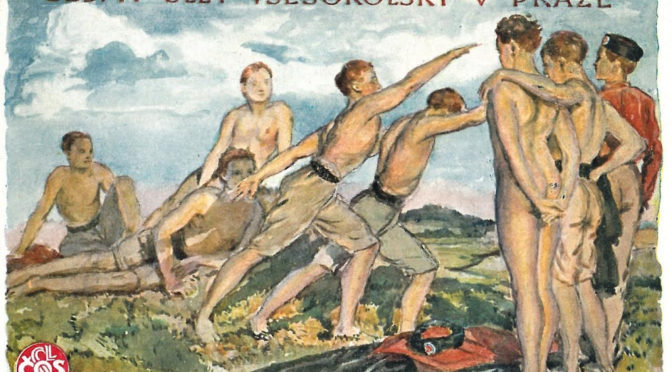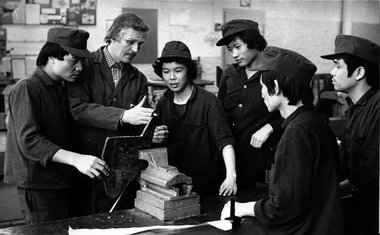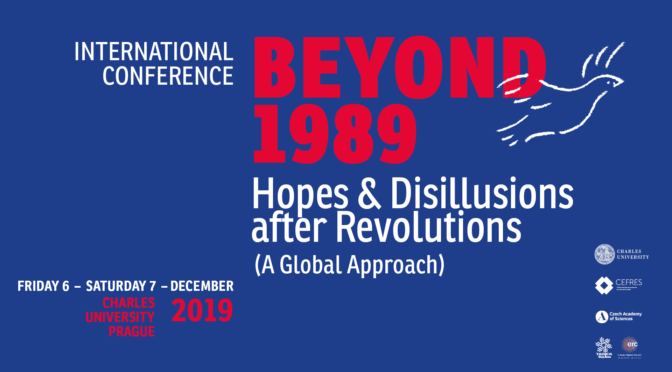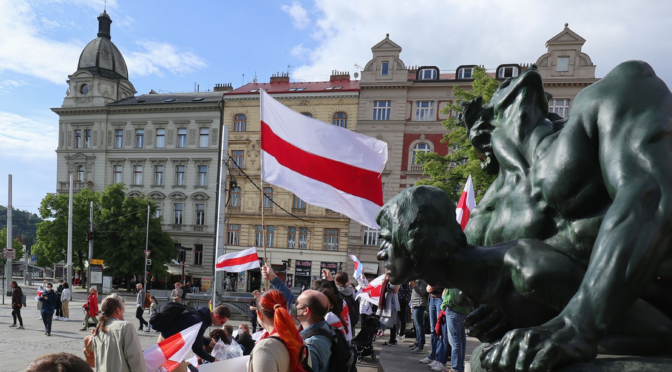BEYOND 1989. Hopes and Disillusions after Revolutions
(A Global Approach)
Mezinárodní konference – Projekce filmu
Datum: 6. a 7. prosince 2019
Místo: Praha (Karolinum, FF UK a IFP)
Organizátoři: CEFRES, FF UK, FSV UK, ÚSD AV ČR a ERC Projekt “Tarica”
Partneři: IFP, FHS UK, Centre of French Civilization and Francophone Studies of Warsaw University (CCFEF), Scientific Centre of the Polish Academy of Sciences in Paris, Institute of Polish Culture of the University of Warsaw (IKP), CNRS Research Unit LADYSS (University Paris I Panthéon-Sorbonne) a GDR Europe Médiane (CNRS)
Jazyk: angličtina
➤ Pro páteční konferenci je nutná registrace na: cefres@cefres.cz
Rok 2019 představuje v Evropě důležitý symbol a významnou pamětní událost. Při příležitosti oslav třiceti let od pádu komunistických režimů ve státech střední a východní Evropy a zároveň patnácti let od jejich evropské integrace se organizují mnohé politické, vzpomínkové a akademické iniciativy po celé Evropě.
Toto třicáté výročí je jedinečnou příležitostí k reflexi revolučních zkušeností a změn režimů v různých historických kontextech. Cílem této konference je proto nabídnout prostřednictvím srovnávacího přístupu širší a nové akademické perspektivy přeměn režimů a přechodů k demokracii. Jedním z našich zaměření bude nepochybně postkomunistická Evropa. Dále i arabský svět po povstáních v roce 2011 nebo po politických transformacích v subsaharské Africe.
Budeme zpochybňovat pojem „revoluce“ několika interpretacemi, které revoluce vyvolává: propagace, sublimace; ale také diskvalifikace, ba dokonce jasné odmítnutí.
PROGRAM
Pátek 6. prosince
Karolinum
Modrá posluchárna, Ovocný trh 560/5
13:30-14:00: Registrace
14:00-15:15: Úvodní projevy
Simultánně tlumočeno do EN / FR / CZ
Mr. Tomáš Petříček, Ministr zahraničních věcí České republiky
Mr. Jean-Yves Le Drian, Ministr zahraničních věcí Francie
15:15-15:30: Úvodní projevy
Lenka Rovná, prorektorka pro evropskou problematiku, UK
Miroslav Vaněk, ředitel ÚSD AV ČR
Jérôme Heurtaux, ředitel CEFRESu
15:30-16:15: 1. keynote speaker
Moderátor: Michal Pullmann, děkan FF UK
Adéla Gjuričová (ÚSD AV ČR): The Unbearable Lightness of Women’s Rights: On Gender Order in Post-Socialist Transformation
16:15-16:45: Pauza na kávu
16:45-17:30: 2. keynote speaker
Georges Mink (College of Europe, CNRS): 1989 Revisited in the Light of its Consequences. Thoughts of a Committed Observer
17:30-18:45: Diskuze u kulatého stolu: Hopes and Disillusions towards European Integration
Ivo Šlosarčík (FSV UK)
Marie-Elizabeth Ducreux (CNRS/EHESS)
Marion Van Renterghem, novinář, Albert-Londres Prize
Michael Žantovský, ředitel Knihovny Václava Havla
18:45: Recepce
Sobota 7. prosince
FF UK (nám. Jana Palacha 1/2)
místnost 104
9:30-10:15: 3. keynote speaker
Moderátor: Eliška Tomalová (FSV UK)
Michal Kopeček (ÚSD AV ČR): Democratic Hopes and Liberal Illusions: the 1989, Post-Dissident Politics of Memory and the Challenge to “Liberal Consensus” in East Central Europe
10:15-12:00: Panel 1: Promoting Revolutions
Moderátor: Pavel Mücke (ÚSD AV ČR)
Federico Tarragoni (Paris-Diderot University): From Revolutions to Revolutionary Subjectivities. Some Sociological Tracks
Matěj Spurný (FF UK, ÚSD AV ČR): Environment in Capitalism. Paths to a Neoliberal Consensus
Ester Sigillò (ERC Tarica): Engaging in Civil Society in Response to the Failure of Political Parties in Tunisia
Eliška Tomalová (FSV UK): Velvet Revolution in Cultural Diplomacy and Nation Branding
Jana Wohlmuth Markupová (FHS UK): Meaning of 17th November 1989 in the Memory of Former Student Protagonists in Czech Republic
Emmanuelle Boulineau (ENS Lyon): Spatial Illusions and Disillusions in Central Europe: Borders, Flows, and Territorial Cooperation
12:00-12:15: Pauza na kávu
12:15-13:45: Panel 2: Disillusions after Revolution
Moderátor: Jérôme Heurtaux (CEFRES)
Éric Aunoble (University of Geneva): Post-Revolutionary Syndromes: The Case of Ukrainian Communists after 1920
Clément Steuer (ERC Tarica): Discrediting the Revolution in Political Discourse: the Role of Counter-Revolutionary Parties in Egypt
Alia Gana (CNRS, ERC Tarica), Maher Ben Rebah (ERC Tarica): Political Disenchantment in Post-Revolutionary Tunisia in the Light of Electoral Processes
Nicolas Maslowski (CCFEF): Post-Dissent: Between Social Resource and Source of Disillusion
Marcel Tomášek (FHS UK): Scholars and Experts’ Disillusions on Post-1989 Dynamics in East-Central Europe
13:45-14:45: Oběd
14:45-17:30: Prezentace studentů
Moderátoři: Paweł Rodak (Warsaw University), Marie-Elizabeth Ducreux (EHESS)
Michal Louč (FHS UK – ÚSTR): The Former Czechoslovak Political Prisoners from the 1950s and their Perceptions of the Velvet Revolution and Dealing with Communism
Václav Rameš (ÚSD – FF UK): The 1989 as an Opportunity for a New Economic Order. Expectations and Disillusionments in the Czechoslovak Post-Communist Ownership Transformation
Marek Skála (FHS UK): The Beginnings of Small Businesses during the Economic Transformation Period
Martin Babička (Oxford University): “We are Buying the Future”: Neoliberalism, Historicity, and the Case of Voucher Privatization in Postsocialist Czechoslovakia
Filip Keller (FF UK): And Then Wolves Have Come. Czechoslovakian Technical Intelligentsia on The Postcommunist Transformation
Pavel Jonák (FHS UK): Great Expectations? Czech Post-Revolutionary Way of Teaching Creative Writing from the Perspective of its Actors
Eliška Černovská (FSV UK): The Role of Guy Erismann in French-Czech(oslovakian) Musical Relations before and after the Velvet Revolution
Igor Zavorotchenko (FHS UK): One Example the 1989/1991 Revolution could not Change the Historical Assessment, Although we did Hope so
16:30-16:45: Pauza na kávu
Klára Žaloudková (FSV UK): Preying on the State: Oligarchization of Bulgaria after 1989
Jiří Kocián (FSV UK): Persistent Burden: Post-1989 Romania and The Quest for Democratic Maintenance
Marek Suk (FF UK): Were Dissidents Representing the Alternative to the Normalisation Regime? Their Political Performance before and shortly after November 1989
Claire Laurent (Université de Strasbourg): “Polszczyzna”: The Hope of a Nation without a State and the Disillusion of a Post-Revolutionary Nation-State
17:30-18:30: Pauza. Přesun do Francouzského institutu v Praze.
Francouzského institutu v Praze (Štepánská 35)
Kino 35
18:30-20:00 Screening of Anna Szczepanska’s film Solidarnosc. How Solidarity Changed Europe, LOOKSfilm/Arte-NDR, Germany, 2019, 52 mn (English subtitles).
Moderátor: Luc Lévy, ředitel IFP
Debata s Annou Szczepanskou a Georges Minkem
20-20:30 Closing Remarks
Nicolas Maslowski (CCFEF), Paweł Rodak (Warsaw University), Aneta Bassa (Polish Academy of Sciences), Jérôme Heurtaux (CEFRES), Eliška Tomalová (FSV UK), Michal Pullmann (FF UK), Pavel Mücke (ÚSD AV ČR), Alia Gana (CNRS, ERC Tarica)





